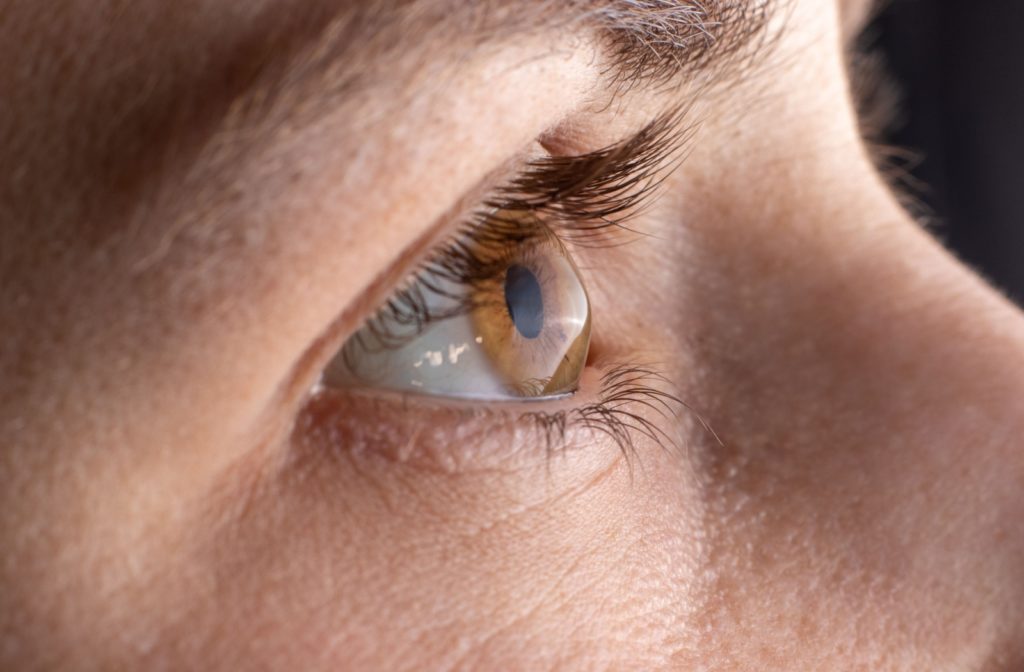Living with keratoconus can be challenging, but that doesn’t mean you have to suffer in silence. This condition primarily affects the cornea—the dome-shaped clear tissue at the front of the eye—and causes significant vision issues. Fortunately, something as simple as a pair of contact lenses can make all the difference in the world!
Some of the best contact lenses for keratoconus include:
- Rigid gas-permeable lenses
- Scleral lenses
- Toric lenses
- Hybrid lenses
What Is Keratoconus?
Keratoconus is a progressive eye condition where the cornea, which is normally dome-shaped, begins to thin and bulge into a cone-like shape. The cornea is responsible for refracting light into the eyes to give you clear vision; when it’s shaped incorrectly, it can quickly start distorting images.
This condition usually develops in late adolescence, though can develop as late as the age of 30. While it typically affects both eyes, it can sometimes only affect one. When left untreated, keratoconus can have significant impacts on your vision.
When it comes to eye conditions, an early diagnosis can make all the difference in the world. During a comprehensive eye exam, your optometrist can look for keratoconus using something called “corneal topography.” This is a noninvasive approach to mapping out the surface of your eye to determine what’s causing your vision problems.
The Symptoms of Keratoconus
Recognizing the symptoms of keratoconus early can help in seeking timely treatment. Some common symptoms include:
- Blurred or distorted vision. This is often the first sign of keratoconus, you may notice that objects appear blurry, wavy, or distorted.
- Increased light sensitivity. This often becomes worse when exposed to glare or bright lights.
- Frequent changes in your prescription. This is a sign that your cornea is shifting shape.
- Double vision. This occurs when the cone shape of your cornea causes light to scatter, resulting in double vision.
- Frequent eye rubbing. While it may seem like an innocent habit, excessive eye rubbing can further damage the cornea and worsen symptoms.
If you notice any of these symptoms, it’s crucial to see an optometrist as soon as you can. Keratoconus is progressive, and symptoms will worsen over time if you leave the problem unaddressed.
How Is Keratoconus Treated?
Treatment for keratoconus varies depending on the severity of the condition. If your vision is relatively stable, you can likely use regular eyeglasses and contact lenses to correct your vision. However, this isn’t always the case, and sometimes, you need a more nuanced approach.
If this is the case, your optometrist will likely recommend specialty contact lenses. So what are the best contact lenses for keratoconus?
1. Rigid Gas-Permeable Lenses
Rigid gas-permeable (RGP) lenses are a popular choice for keratoconus patients. These lenses are made from a firm, oxygen-permeable material that maintains its shape on the eye. RGP lenses offer plenty of benefits, including:
- Improved vision
- Durability
- Breathability
However, RGP lenses can take some time to get used to, and some people may find them less comfortable at first. There’s likely going to be an adjustment period, but the visual improvement often outweighs this drawback!
2. Scleral Lenses
Scleral lenses are larger than traditional contact lenses and rest on the sclera (the white part of the eye) rather than the cornea. These lenses create a tear-filled vault over the cornea, providing several benefits for keratoconus patients:
- Improved comfort, as the lenses don’t touch the cornea itself
- Stability, as the lenses arch over the eye and are less likely to move
- Moisture retention, as the shape traps a small reservoir of tears to keep the eye hydrated
These contacts can be a comfortable and convenient option due to their shape. They’re comfortable and effective, making them a popular choice for plenty of cornea-related issues.
3. Toric Lenses
Toric lenses are specifically designed for individuals with corneal issues like keratoconus. These lenses come with different prescriptions in different meridians of the lens, allowing for better vision correction.
The key benefits of toric lenses include:
- Customized fit, as the lenses are tailored to your unique corneal shape
- Stability, as the unique shape reduces the likelihood of lens rotation
- A variety of materials, which can be adapted to your individual comfort and preference
Toric lenses can be an excellent choice for those who have mild to moderate keratoconus and need an effective solution for their vision issues.
4. Hybrid Lenses
Hybrid lenses combine the best features of both rigid gas-permeable (RGP) lenses and soft lenses. They have a central rigid zone surrounded by a soft outer skirt, designed to offer the clarity of RGP lenses with the comfort of softer lenses.
The benefits of hybrid lenses include:
- Enhanced comfort, as the comfort of the softer lenses offsets the discomfort often caused by RGP lenses
- Clear vision, as the rigid materials in the center provide excellent visual clarity
- Stability, as the design helps the lenses maintain a stable fit
Overall, hybrid lenses can offer an ideal balance for keratoconus patients seeking both clarity and comfort in their contact lenses.

When to See Your Optometrist
Keratoconus may present challenges, but the right optometrist can help you manage this condition effectively. From RGP to hybrid lenses, understanding your options is the first step toward clear and comfortable vision. Remember, the right lens can make all the difference.
If you experience any symptoms of keratoconus or need help finding the right lenses, book an appointment with our team at Total Vision Pacific EyeCare today. Our team is here to help you every step of the way.



